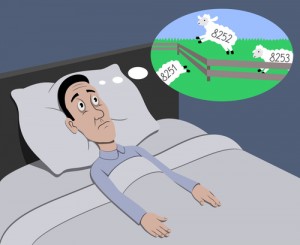
defining insomnia in a lay man's term, insomnia can be defined as the inability to sleep
in other definations....Insomnia, or sleeplessness, is a sleep disorder in which there is an inability to fall asleep or to stay asleep as long as desired.[1][2] While the term is sometimes used to describe a disorder demonstrated by polysomnographic evidence of disturbed sleep, insomnia is often practically defined as a positive response to either of two questions: "Do you experience difficulty sleeping?" or "Do you have difficulty falling or staying asleep?"Insomnia is most often thought of as both a medical sign and a symptom that can accompany several sleep, medical, and psychiatric disorders characterized by a persistent difficulty falling asleep and/or staying asleep or sleep of poor quality. Insomnia is typically followed by functional impairment while awake. Insomnia can occur at any age, but it is particularly common in the elderly. Insomnia can be short term (up to three weeks) or long term (above 3–4 weeks), which can lead to memory problems, depression, irritability and an increased risk of heart disease and automobile related accidents.
Types of insomnia
Insomnia can be classified as transient, acute, or chronic.- Transient insomnia lasts for less than a week. It can be caused by another disorder, by changes in the sleep environment, by the timing of sleep, severe depression, or by stress. Its consequences – sleepiness and impaired psychomotor performance – are similar to those of sleep deprivation.[12]
- Acute insomnia is the inability to consistently sleep well for a period of less than a month. Insomnia is present when there is difficulty initiating or maintaining sleep or when the sleep that is obtained is non-refreshing or of poor quality. These problems occur despite adequate opportunity and circumstances for sleep and they must result in problems with daytime function.Acute insomnia is also known as short term insomnia or stress related insomnia.
- Chronic insomnia lasts for longer than a month. It can be caused by another disorder, or it can be a primary disorder. People with high levels of stress hormones or shifts in the levels of cytokines are more likely to have chronic insomnia.Its effects can vary according to its causes. They might include muscular fatigue, hallucinations, and/or mental fatigue. Some people that live with this disorder see things as if they are happening in slow motion, wherein moving objects seem to blend together.Chronic insomnia can cause double vision
Treatment
It is important to identify or rule out medical and psychological causes before deciding on the treatment for insomnia.[43] Cognitive behavioral therapy (CBT) "has been found to be as effective as prescription medications are for short-term treatment of chronic insomnia. Moreover, there are indications that the beneficial effects of CBT, in contrast to those produced by medications, may last well beyond the termination of active treatment."[44] Pharmacological treatments have been used mainly to reduce symptoms in acute insomnia; their role in the management of chronic insomnia remains unclear.[7] Several different types of medications are also effective for treating insomnia. However, many doctors do not recommend relying on prescription sleeping pills for long-term use. It is also important to identify and treat other medical conditions that may be contributing to insomnia, such as depression, breathing problems, and chronic painhmmmmm! God help us
Comments
Post a Comment